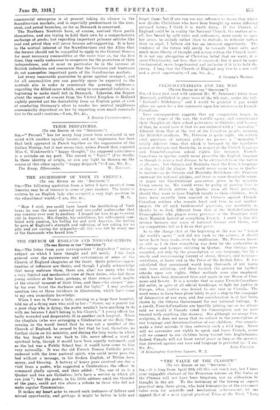THE CHURCH OF ENGLAND AND NONCONFORMISTS. [To THE EDITOR OF
THE " SPECTATOR."] SIR,—The letter from your correspondent " Anglo-Scot " raises a subject on which 1 have thought and felt much. I too have grieved over the narrowness and sectarianism of some of the Church of England chaplains at the front. Quite priceless oppor- tunities of influence are theirs, and though I gladly acknowledge that many embrace them, there are, alas! too many who take a very limited and mechanical view of their duties, who fail these young soldiers at the hour, perhaps, of their utmost need, maybe at the crucial moment of their lives, and then—the chance "goes by for ever 'twixt the darkness and the light." I may perhaps mention two or three incidents in illustration, which have come to my own immediate knowledge.
When I was in France a lady, nursing in a large base hospital, told me of a dying man who said to her : " Sister, say a prayer for a poor chap who is dying; the padre wouldn't have anything to do with me because I don't belong to his Church." A young officer lay badly wounded and desperately ill in another such hospital. When. the chaplain (who was arranging a Celebration of the Holy Com- munion in the ward) found that he was not a member of the Church of England, he seemed to feel that he had, therefore, no further claim on his ministry, and during the long weeks in which the boy fought his way back to life, never offered a word of spiritual help, though it would have been eagerly welcomed; and as the lad was a Public School boy, it would have come to him very naturally. It was the old French Roman Catholic priest, endowed with the true pastoral spirit, who could never pass the bed without a message, in his broken English, of Divine love, mercy, and blessing. A battery of heavy guns received one day a visit from a padre, who suggested a Celebration; the officer in command gladly agreed, and then added: "No, one of us is a Quaker and two are Catholics; let's have a service in which all can join"; but the padre, in his little address amid the thunder of the guns, could not rise above a rebuke to those who did not make regular Communions.
It makes my heart ache to record such instances of failure and missed opportunity, and perhaps it might be better to hide and
forget them; but if one can use any influence to lessen that which now divides Christians who have been brought up under differing outward forms, I think it is worth doing. If the Church of England could be iu reality the National Church, the mother of st- all, less bound by cold rules and ordinances, more ready to open her struts, to include rather than to exclude, to welcome rather than to repel, I believe she has an immense opportunity. The tendency of the future will surely be towards fewer sects and much snore liberty of thought and action within the Church itself. It is not any abrogation of Christian belief that we want; it is snore Christianity, not less, that is required; but it must be more fundathental, more large-hearted and inclusive if it is to hold the young. I long that the Church of England may rise to a new call and a great opportunity.—I am, Sir, &e.,
A SOLDIER'S Isfornse.


























 Previous page
Previous page